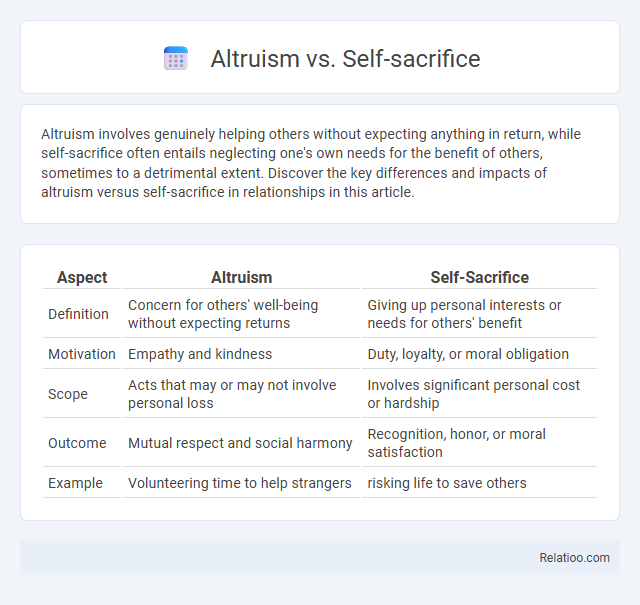Altruism involves genuinely helping others without expecting anything in return, while self-sacrifice often entails neglecting one's own needs for the benefit of others, sometimes to a detrimental extent. Discover the key differences and impacts of altruism versus self-sacrifice in relationships in this article.
Table of Comparison
| Aspect | Altruism | Self-Sacrifice |
|---|---|---|
| Definition | Concern for others' well-being without expecting returns | Giving up personal interests or needs for others' benefit |
| Motivation | Empathy and kindness | Duty, loyalty, or moral obligation |
| Scope | Acts that may or may not involve personal loss | Involves significant personal cost or hardship |
| Outcome | Mutual respect and social harmony | Recognition, honor, or moral satisfaction |
| Example | Volunteering time to help strangers | risking life to save others |
Understanding Altruism: Definition and Core Principles
Altruism involves acting with genuine concern for the well-being of others, driven by empathy and a desire to help without expecting personal gain. Self-sacrifice refers to willingly giving up one's own interests or needs, often placing others' welfare above your own, even at significant personal cost. Understanding these core principles helps clarify the distinction between altruism as a motivational state and self-sacrifice as its possible behavioral expression.
Self-Sacrifice: Meaning and Psychological Foundations
Self-sacrifice involves willingly giving up personal interests or well-being for the benefit of others, often driven by deep psychological needs such as empathy, moral values, or social bonding. Understanding the psychological foundations reveals that self-sacrifice is not merely an act of altruism but a complex interplay of identity, duty, and emotional satisfaction rooted in evolutionary biology and social conditioning. Your awareness of these distinctions can enhance empathy and improve interpersonal relationships by recognizing the motivations behind selfless actions.
Key Differences Between Altruism and Self-Sacrifice
Altruism involves acting to benefit others without expecting anything in return, often motivated by genuine concern for their well-being, whereas self-sacrifice entails giving up one's own interests, comfort, or even life for the benefit of others, sometimes at great personal cost. Key differences include altruism's emphasis on voluntary acts driven by empathy or moral values, while self-sacrifice often implies a higher degree of personal loss and commitment. Altruism typically focuses on positive social outcomes without significant self-harm, contrasting with self-sacrifice, which can involve enduring hardship or suffering to protect or aid others.
Historical Perspectives on Helping Others
Historical perspectives on helping others reveal distinct nuances between altruism, self-sacrifice, and egoistic acts. Altruism involves genuine concern for the well-being of others without expecting personal gain, prominently discussed in Darwin's theory of natural selection and cultural evolution. Self-sacrifice often implies enduring personal loss or risk for the benefit of others, historically valorized in many religious and philosophical traditions as the highest form of moral conduct, shaping how you understand moral duty and social cohesion.
Motivations Behind Altruistic and Self-Sacrificial Behavior
Motivations behind altruistic behavior stem from genuine concern for others' well-being, driven by empathy and the desire to improve someone else's situation without expecting anything in return. Self-sacrificial behavior, however, often involves prioritizing others' needs even at personal cost, motivated by principles such as moral duty or deep social bonds. Your understanding of these distinctions highlights how both behaviors contribute uniquely to social cohesion and interpersonal trust.
Cultural Influences on Acts of Altruism and Self-Sacrifice
Cultural influences significantly shape how altruism and self-sacrifice are expressed and valued across societies. Collectivist cultures, such as those in East Asia, often emphasize self-sacrifice for family and community well-being, promoting acts that prioritize group harmony over individual needs. In contrast, individualistic cultures, like many Western societies, tend to encourage altruism through voluntary, empathy-driven actions that respect personal boundaries and individual autonomy.
The Role of Empathy in Altruism vs Self-Sacrifice
Empathy plays a crucial role in motivating both altruism and self-sacrifice by enabling individuals to understand and share the feelings of others, driving prosocial behavior. In altruism, empathy fosters spontaneous acts of kindness without expecting personal gain, whereas in self-sacrifice, empathy often leads to enduring personal costs to benefit others. Neuroscientific studies reveal that empathetic responses activate brain regions associated with both emotional sharing and decision-making, highlighting empathy's complex influence on altruistic and self-sacrificial choices.
Benefits and Drawbacks of Altruism and Self-Sacrifice
Altruism promotes positive social relationships and community well-being by prioritizing others' needs, but it can lead to neglect of self-care and potential exploitation. Self-sacrifice often involves greater personal cost, risking physical, emotional, or financial harm, yet it can inspire trust and strengthen group cohesion. Balancing genuine altruistic acts with healthy boundaries ensures both personal sustainability and effective support for others.
Case Studies: Altruism and Self-Sacrifice in Action
Case studies of altruism and self-sacrifice reveal distinct motivations and outcomes in prosocial behavior, with altruism driven by genuine concern for others' well-being and self-sacrifice often involving personal cost for a greater good. Research on emergency responders and charitable acts highlights how altruistic actions can enhance social cohesion and trust, whereas self-sacrificial acts frequently underscore moral courage and commitment to community values. Empirical evidence from psychological and sociological studies demonstrates that both behaviors, despite their differences, play critical roles in fostering empathy and collective resilience.
Finding Balance: Fostering Healthy Helping Behaviors
Finding balance between altruism, self-sacrifice, and healthy helping behaviors is essential to maintain personal well-being while supporting others effectively. Altruism involves genuine concern for others' welfare without expecting anything in return, whereas self-sacrifice may lead to burnout if you consistently neglect your own needs. Cultivating awareness of your limits ensures that your acts of kindness remain sustainable and beneficial for both you and those you help.

Infographic: Altruism vs Self-sacrifice
 relatioo.com
relatioo.com